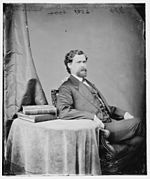Solomon L. Hoge, Date of Birth, Place of Birth, Date of Death
TweetSolomon L. Hoge
American politician
 Date of Birth: 11-Jul-1836
Date of Birth: 11-Jul-1836
 Place of Birth: Pickrelltown, Ohio, United States
Place of Birth: Pickrelltown, Ohio, United States
Date of Death: 23-Feb-1909
Profession: judge, lawyer, politician
Nationality: United States
Zodiac Sign: Cancer 
About Solomon L. Hoge
- Solomon Lafayette Hoge (July 11, 1836 – February 23, 1909) was a lawyer, soldier, judge and politician in Ohio and South Carolina. Hoge was born in Pickrelltown, Ohio, and he received his early childhood education at the public schools in the nearby city of Bellefontaine.
- Afterwards, he received a classical education at Geneva College in Northwood and he graduated from Cincinnati Law School in 1859.
- Hoge was admitted to the bar the same year and commenced the practice of law in Bellefontaine.
- Upon the outbreak of the Civil War in 1861, Hoge enrolled in the Union Army as a First Lieutenant in the Ohio Volunteer Infantry.
- He was promoted to captain and became the commander of a Federal company of infantry. After the war, Hoge settled in Columbia, South Carolina, and despite possessing little legal experience was elected in 1868 as an associate justice to the South Carolina Supreme Court.
- While on the bench, Hoge never wrote a single opinion and "I concur" was the extent of his legal analysis.
- He was aware of his incapacity as a judge and he only served eighteen months on the bench before moving on to the House of Representatives. Hoge won a seat as a Republican to represent the 3rd congressional district after he successfully challenged the election of Democrat J.P.
- Reed to the Forty-first Congress.
- Since the Republicans controlled Congress, the two Democrats elected from South Carolina were unseated and Hoge filled the seat on April 8, 1869 and served the remainder of the term until March 3, 1871.
- Running on the Republican ticket with Franklin J.
- Moses, Jr.
- for governor in 1872, Hoge won the race for comptroller general against the Independent Republican candidate J.
- Scott Murray of Anderson.
- In 1874, Hoge waged another run for Congress to represent the 3rd district and he defeated Samuel McGowan, a Conservative Party candidate, to win the seat. In 1870, Hoge appointed James Webster Smith, a former slave, to the United States Military Academy marking the first time an African-American had been admitted.
- Six years later, in 1876 Hoge appointed Johnson Chesnut Whittaker, another African-American, to the United States Military Academy.Upon the completion of Hoge's term in 1877, South Carolina Republicans were in a state of disarray following Wade Hampton's victory in the 1876 gubernatorial election.
- Most white carpetbaggers left the state and Hoge was no different.
- He moved to Kenton, Ohio and practiced law there until 1882 when he became president of the First National Bank of Kenton.
- Hoge died in Battle Creek, Michigan, and was interned at Grove Cemetery in Kenton.
Read more at Wikipedia
See Also
- Famous People's Birthdays on 11 July, United States
- Famous People's Birthdays in July, United States
- Famous judge's Birthdays on 11 July, United States
- Famous judge's Birthdays in July, United States
- Famous lawyer's Birthdays on 11 July, United States
- Famous lawyer's Birthdays in July, United States
- Famous politician's Birthdays on 11 July, United States
- Famous politician's Birthdays in July, United States


